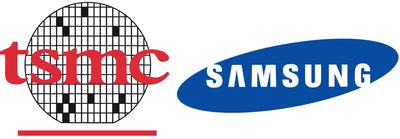TSMC Rumored to Be Sole Supplier of A-Series iPhone Chips in 2018
Earlier this week, a report by The Korea Herald suggested that Samsung Electronics could be returning as a supplier for the so-called A12 chip in 2018's line of iPhones, after being removed from the A-series chip supply chain in 2016 and 2017, years in which Taiwan Semiconductor Manufacturing Company took on all of the orders. Now, industry observers reported upon by DigiTimes are predicting that TSMC is "still likely" to retain its title as the sole manufacturer of A-series chips in 2018.
In today's report, TSMC's integrated fan-out wafer-level packaging technology -- which the supplier uses in its 7-nanometer FinFET chip fabrication -- is looked at as largely superior to any progress made by Samsung in the same field. Samsung is said to be "aggressively vying" for A-series orders from Apple ahead of 2018, but DigiTimes' sources state that even the company's close ties to OLED might not be enough for Apple to add Samsung as a secondary A-series supplier for the reported three iPhones launching in fall 2018.

It is unlikely Samsung will be able to regain application processors orders for Apple's iPhone, as TSMC's in-house developed InFO wafer-level packaging will make the Taiwan-based foundry's 7nm FinFET technology more competitive than Samsung's, said the observers.
Samsung has grabbed Apple's A9 chip orders for the new 9.7-inch iPads introduced earlier in 2017, the observers claimed. TSMC, which is already the sole supplier of Apple's 10nm A11 chips for the upcoming iPhones, will still likely obtain all of the next-generation A-series chip orders for Apple's 2018 series of iPhones with its 7nm FinFET process, the observers said.
TSMC's innovation in backend packaging plays a key role in securing exclusive orders for Apple's processors for the upcoming iPhones, the observers noted.
In Tuesday's report, it was rumored that Samsung Electronics co-CEO Kwon Oh-hyun already made a deal with Apple concerning 2018 iPhone chip production during a visit to Cupertino last month. Otherwise, The Korea Herald's report was light on details, with no clear indication on exactly how many orders Samsung might have gained from such a deal besides believing the company would "share some parts" of A-series chip production with TSMC.
If Apple kept TSMC as the sole A-series manufacturer in 2018, it would mark the third year in a row that the supplier created iPhone chips alone, following the A10 in the iPhone 7 and iPhone 7 Plus, and the A11 in the upcoming "iPhone 8," "iPhone 7s," and "iPhone 7s Plus." Otherwise, a return to dual-sourced A-series chips in 2018 would be the first time Apple made that move since 2015, when both Samsung and TSMC supplied the A9 chip in the iPhone 6s and iPhone 6s Plus, which frustrated some users when TSMC's technology was discovered to boast marginally better battery life.
Popular Stories
Apple's next-generation iPhone 17 Pro and iPhone 17 Pro Max are just over two months away, and there are plenty of rumors about the devices.
Below, we recap key changes rumored for the iPhone 17 Pro models.
Latest Rumors
These rumors surfaced in June and July:Apple logo repositioned: Apple's logo may have a lower position on the back of the iPhone 17 Pro models, compared to previous...
Apple should unveil the iPhone 17 series in September, and there might be one bigger difference between the Pro and Pro Max models this year.
As always, the Pro Max model will be larger than the Pro model:iPhone 17 Pro: 6.3-inch display
iPhone 17 Pro Max: 6.9-inch displayGiven the Pro Max is physically larger than the Pro, it has more internal space, allowing for a larger battery and...
In 2020, Apple added a digital car key feature to its Wallet app, allowing users to lock, unlock, and start a compatible vehicle with an iPhone or Apple Watch. The feature is currently offered by select automakers, including Audi, BMW, Hyundai, Kia, Genesis, Mercedes-Benz, Volvo, and a handful of others, and it is set to expand further.
Apple has a web page with a list of vehicle models that ...
The calendar has turned to July, meaning that 2025 is now more than half over. And while the summer months are often quiet for Apple, the company still has more than a dozen products coming later this year, according to rumors.
Below, we have outlined at least 15 new Apple products that are expected to launch later this year, along with key rumored features for each.
iPhone 17 Series
iPho...
Apple is continuing to refine and update iOS 26, and beta three features smaller changes than we saw in beta 2, plus further tweaks to the Liquid Glass design. Apple is gearing up for the next phase of beta testing, and the company has promised that a public beta is set to come out in July.
Transparency
In some apps like Apple Music, Podcasts, and the App Store, Apple has toned down the...
Since the iPhone X in 2017, all of Apple's highest-end iPhone models have featured either stainless steel or titanium frames, but it has now been rumored that this design decision will be coming to an end with the iPhone 17 Pro models later this year.
In a post on Chinese social media platform Weibo today, the account Instant Digital said that the iPhone 17 Pro models will have an aluminum...
New renders today provide the best look yet relocated Apple logo and redesigned MagSafe magnet array of the iPhone 17 Pro and iPhone 17 Pro Max.
Image via Majin Bu.
Several of the design changes coming to the iPhone 17 Pro model have been rumored for some time, such as the elongated camera bump that spans the full width of the device, with the LiDAR Scanner and flash moving to the right side.
...
Amazon is soon to be back with its annual summertime Prime Day event, lasting for four days from July 8-11, the longest Prime Day yet. As it does every year, Prime Day offers shoppers a huge selection of deals across Amazon's storefront, and there are already many deals you can get on sale ahead of the event.
Note: MacRumors is an affiliate partner with Amazon. When you click a link and make a ...
Apple's position as the dominant force in the global true wireless stereo (TWS) earbud market is expected to continue through 2025, according to Counterpoint Research.
The forecast outlines a 3% year-over-year increase in global TWS unit shipments for 2025, signaling a transition from rapid growth to a more mature phase for the category. While Apple is set to remain the leading brand by...






















